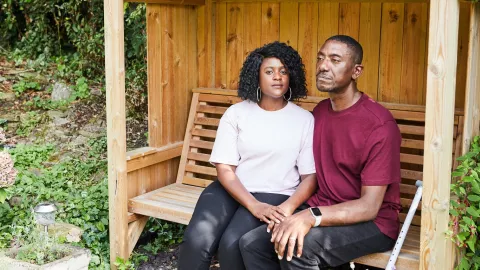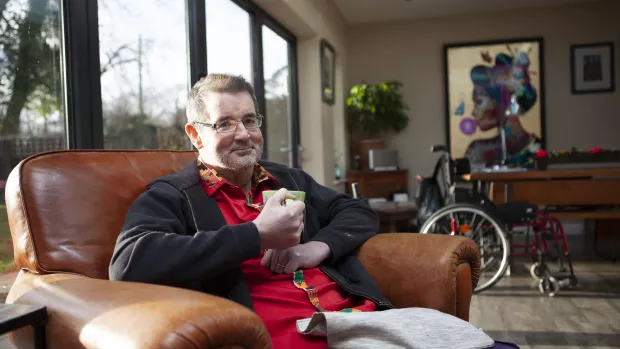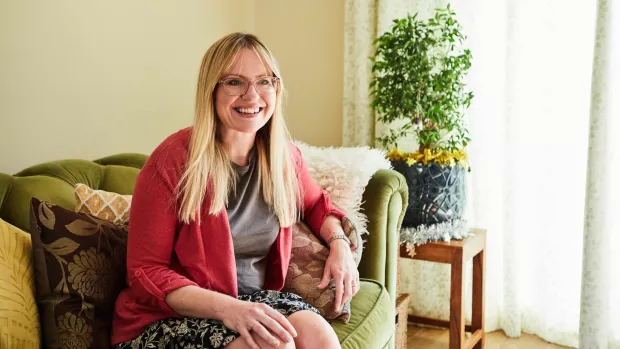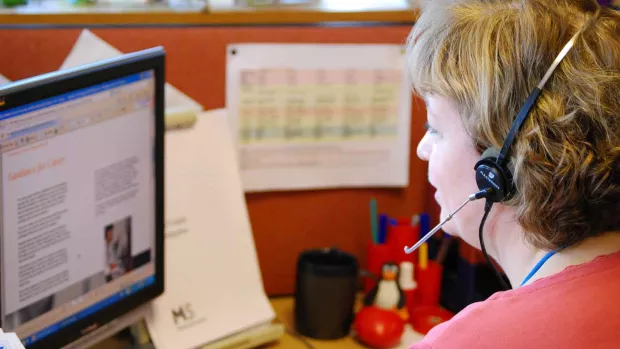
Stopping MS would improve all of our lives
Nikoma was diagnosed with relapsing remitting MS in 2018. He and his wife Simone are hopeful that new research will stop MS, and its knock-on effects on the whole family.
What does stopping MS mean to each of you?
Nikoma: It would be massive for me. When I was working as a sound engineer, before I was diagnosed, I was nearing the top of my game. I think I could have really flourished from where I was. And then it all stopped. My career had to take a new direction.
Simone: Stopping MS would mean the knock-on effects of MS would stop too. So all the care I give, the extra support I have to give, how it affects our young daughter. Stopping MS would improve all of our lives.
It’s physical things I help with. So cooking, cleaning, sometimes helping Nik up the stairs or to get around. But then there’s also things like brain fog or fatigue that affect Nik. So I now take the lead on a lot of financial and house things. I also help with phone calls. Sometimes I need to step in and say ‘can I talk?’. And he'll give me consent to talk on certain calls because he can't necessarily follow a conversation due to brain fog or fatigue. It's really every aspect.
Stopping MS would mean the knock-on effects of MS would stop too. So all the care that I give, the extra support that I have to give, how it affects our young daughter. Stopping MS would improve all of our lives.
Nikoma: The things I need help with change day to day, and during the day as well. I can start the day more independently. But then maybe because I’ve done too much, or I've just got too hot, I literally can’t do anything. And Simone has to take over.
I've got a lot of aids to help me, like a perching stool. They do really help. But then there might be a point where I can't even be in the kitchen - it can be anywhere on that scale.
Why do you think it's important that we research MS? Are there any particular breakthroughs you'd like to see?
Simone: Research is important because there's so much that's unknown. Before Nik’s diagnosis, I knew nothing at all about MS. But even when it was diagnosed, there were still so many unanswered questions. I’d like to know why it affects everybody so differently, even if they've got the same type of MS. Why are some people’s symptoms dramatically worse?
I know there is some understanding of causes of relapses and things like that. But I want to see more information around the differences with ethnicity and race, for example. I’d like to see more understanding around why Black people seem to be differently affected than White people. And yet there seems to be such an underrepresentation of Black people in research and in literature.
Research is important because there's so much that's unknown. Before Nik’s diagnosis, I knew nothing at all about MS. But even when it was diagnosed, there were still so many unanswered questions.
Nikoma: It's important to research MS because it has such a deep impact. It doesn't just affect the person who has MS, it affects the family and the extended family too. Often they don't know what to do, they don't know how to react and how to help – to make it better for the person with MS.
Why do you think it's important to connect with others living with MS?
Simone: When I speak to caregivers and family members I hear how isolating it can be for people. A lot of people don't know about MS, people don't understand the effects - the physical effects and everything else. And so when you try to talk about it or explain it, people don't always get it. And this can make it isolating for those of us going through it.
From speaking to others I know many people feel they’re the only ones going through it. Especially if no one else in your family or friendship group has MS, and you've never come across it.
Connecting with others has helped me see we’re not the only ones going through this. We’re not the only ones feeling that, we’re not the only ones that have those down days. It also makes it less of a taboo subject. The more people actually talk about it, the more there is understanding, and hopefully more consideration and support.
Nikoma: It is very isolating. I also think that as so many people have been diagnosed with MS, there are some shared experiences. So it can help to get together and share tips on how to cope with certain situations.
Simone: Also, from a caregiver’s perspective, I’m not the actual person with the condition, but it can be very difficult mentally. A lot more is added to my plate and life is changed. But I don't always feel comfortable talking to Nik about that because I feel it sounds selfish. If I offload to another caregiver, they will understand some of those things and we can relate to each other.
Nikoma: We need to look after the caregivers as well. And they need a safe space for that sharing, too.
We need to look after the caregivers as well.
What does it mean to you both that there's people out there donating to this campaign stop MS
Simone: I’m grateful that people are donating because it's so important. We know that research is very costly, and so without donations it wouldn't be possible.
And so everybody that donates is really helping to stop MS and is helping to better our lives, too.
Will you help us stop MS?
We’re making real progress in all areas of myelin repair research. Will you donate today to help us continue to build the connections between MS, its causes, and how we can stop it?




